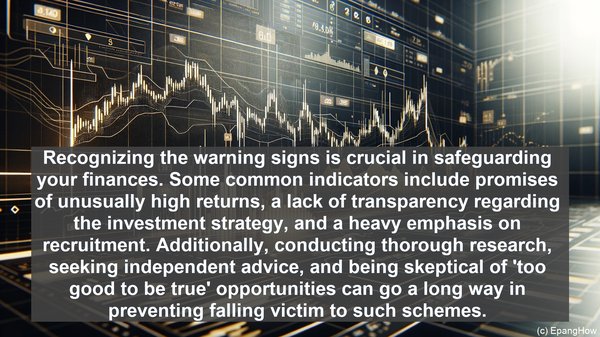Introduction: The Allure of High Returns
Hello everyone! In the realm of investments, the promise of extraordinary returns can be incredibly enticing. However, not all opportunities are what they seem. Today, we’re exploring the differences between two notorious types of financial fraud: Ponzi schemes and pyramid schemes.
The Ponzi Scheme: A One-Man Show
The Ponzi scheme, named after the infamous Charles Ponzi, revolves around a single individual or entity. The orchestrator entices investors by promising unusually high returns in a short period. Initially, the returns are paid using the investments of new participants, creating an illusion of success. However, as the scheme grows, it becomes unsustainable, and when new investors dry up, the entire structure collapses.
The Pyramid Scheme: Building an Illusion
Unlike the Ponzi scheme, pyramid schemes involve a hierarchical structure. Participants are encouraged to recruit new members, who, in turn, invest a portion of their funds. The recruiter receives a percentage of the new member’s investment, while a portion goes to the person above them. This continues, with each level expanding, until the base becomes too large to sustain. When recruitment slows down, the pyramid crumbles, leaving those at the bottom with significant losses.

Legal Ramifications: Ponzi Schemes vs Pyramid Schemes
Both Ponzi and pyramid schemes are illegal in most jurisdictions. However, the legal consequences can differ. In a Ponzi scheme, the orchestrator is the primary target, as they actively misrepresent the investment opportunities. In a pyramid scheme, while the top-level participants are also liable, those lower down the pyramid may argue that they were unaware of the fraudulent nature of the scheme.

Spotting the Red Flags: Protecting Yourself
Recognizing the warning signs is crucial in safeguarding your finances. Some common indicators include promises of unusually high returns, a lack of transparency regarding the investment strategy, and a heavy emphasis on recruitment. Additionally, conducting thorough research, seeking independent advice, and being skeptical of ‘too good to be true’ opportunities can go a long way in preventing falling victim to such schemes.
